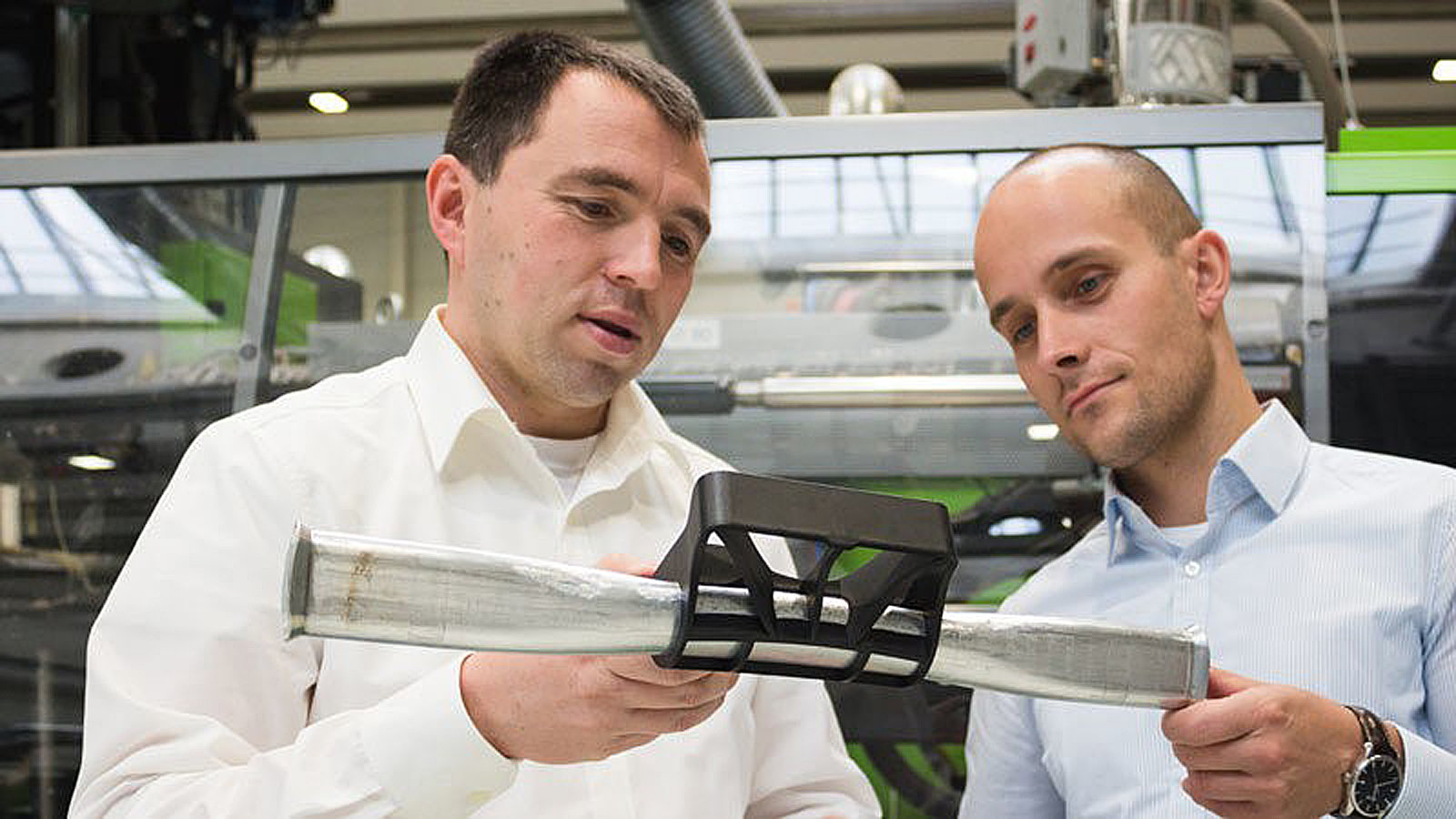More Efficient Production of Hybrid Components
The Federal Cluster of Excellence MERGE and Fraunhofer IWU are researching process combinations for manufacturing metal-plastics components for cost-efficient automotive applications
-

André Albert (on the left) of Fraunhofer IWU and Markus Layer from the Department of Lightweight Structures and Polymer Technology examining a cockpit carrier produced using a novel process combination and intended for the electric vehicle “Kulan”. Photo: Vivek Bakul Maru
Hybrid metal-plastics components have become increasingly important in automotive lightweight construction. Nevertheless, their production requires a lot of labour and time, which is why the Fraunhofer Institute for Machine Tools and Forming Technology (IWU) and the Federal Cluster of Excellence MERGE at Chemnitz University are conducting research on possible process combinations. “In these manufacturing processes we combine hydroforming or deep-drawing with injection moulding. Thus, the hybrid components can be produced in one and the same machine”, explains André Albert, leader of the Fraunhofer internal group “Forming based on active media”.
The developed hybrid metal-plastics components have a thin-walled metal structure combined with reinforcing plastics. In the conventional method the metal component is produced separately by deep-drawing or injection moulding and subsequently joined with the plastic component through injection moulding with additional bonding agents. This complex process has now been simplified by merging it into a single-step production process.
High Pressure for Strong Adhesion
The production is split up into two consecutive process steps. Deep-drawing and injection moulding are combined so that the metal sheet will first be formed through deep-drawing and then the plastic will be moulded to it. “The injection moulding process uses high pressure of up to 1,000 bar. We can consecutively use this pressure to form the sheet even more. Due to the melt pressure of the plastic the metal sheet will change form again, and an undercut will emerge. This makes the plastic and the metal sheet join perfectly. The adhesion is promoted by bonding agents”, explains Markus Layer, research fellow at the Department of Lightweight Structures and Polymer Technology, concerning the issue of how the plastic melt is used as an active medium for metal forming.
In another scenario, hydroforming and injection moulding are combined by placing a metal tube in a tool and injecting a gaseous active medium under high pressure. The tube can be formed through the internal pressure. This gas pressure is used as support and counter-pressure at the same time, since the subsequently injected plastic melt connects with the tube’s surface with very high pressure and might thus form the tube in a way that was not intended. “Due to the internal pressure within the tube, the plastic components can easily be added through injection moulding and the tube maintains its form”, Layer describes the new and improved process. Taking this into account when designing the tube and mould dimensions, bonding agents may be rendered unnecessary.
Efficient Manufacturing with many Advantages
Both manufacturing processes create metal-plastic compounds in one and the same machine and very few process steps, thereby reducing labour and cost immensely and saving resources. In the long run, the metal sheets and tubes will be replaced by alternative materials such as fibre-reinforced plastics.
Apart from the reduction in labour, time and cost, additional advantages of the novel processes are the protection of surfaces as well as the evenly spread stress on the material. The usual bonding agents and surface structurings for the combination of metal and plastics are not required anymore. Possible applications for such hybrid components produced through hydroforming and injection moulding lie mainly in the automotive industry, e.g. in cockpit or front-end carriers for attaching additional components within the vehicle.
For further information please contact André Albert, leader of the Fraunhofer internal group “Forming based on active media”, phone 0371 5397-1127, e-mail andre.albert@iwu.fraunhofer.de, or Markus Layer, research fellow at the Department of Lightweight Structures and Polymer Technology, phone: 0371 531- 38736, e-mail markus.layer@mb.tu-chemnitz.de. (By: Katharina Wolfrum)
Matthias Fejes
13.11.2017




